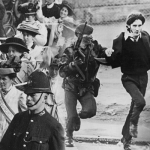 ERC research project Remembering Activism: The Cultural Memory of Protest in Europe; Ann Rigney and Sophie van den Elzen (Web)
ERC research project Remembering Activism: The Cultural Memory of Protest in Europe; Ann Rigney and Sophie van den Elzen (Web)
Time: 19.-21.10.2022
Venue: Utrecht University
Proposals by: 01.03.2022
In 1903, British suffragettes adopted the motto „Deeds not words“ to signal their tactical shift from peaceful protest to a more direct and violent repertoire of action. Despite the popularity of this refrain over the century that followed, it is clear that words play a pivotal role in political activism. They are used to frame injustice, establish worthiness and authority, connect chanting crowds, and claim new speaking positions. Moreover, investigations into the „significant, binding words“ of modern discourse have frequently focused on the language of political change and dissent (Williams 1983, 15), as the Keywords projects following in the footsteps of Raymond Williams‘ seminal publication attest (Rodgers 1987, Jeffries and Walker 2018, Leary 2019).
This expert meeting seeks to gather scholars across disciplines to investigate a key aspect of the power of words which is frequently overlooked or left implicit: the way in which words mediate actors‘ relationship to the past, and to canonical events in the transnational history of political activism. In doing so, it looks to make a significant contribution to the study of the „memory-activism nexus“ (Rigney 2018), and to respond to the contemporary sense of urgency around the politics of language (see, for instance, Modest and Lelijveld 2018).
The gathering is organized around the hypothesis that keywords, slogans, and historical shorthands play a key role in structuring traditions of political activism. Slogans like ¡No Pasarán! („they shall not pass“) travel across time and place to mobilise crowds. Shorthands like the soixante-huitards or Forty-Eighters function as proud monikers to cement generational unity and import particular narrative frames into debates. Retrospective realignment, or „rhetorical redescription“ of canonical events in modern vocabulary (Skinner 1999, 67), such as the recent relabeling of the Tulsa Race Massacre in the Library of Congress (OU, 2021), creates new narrative continuities.
Studying activist language use through the lens of cultural memory, this event seeks to advance recent work in social movement studies, memory studies, conceptual history, and discourse analysis. The meeting will eventually result in a special issue or edited volume of contributions which aims to:
- identify key aspects of what, paraphrasing Sidney Tarrow (2014, 21) and Carol Gluck (2009, 3), could be called the ‚word work‘ of social movements. This includes the deliberate creation of historical continuity, and the promotion of particular historical and/or master narratives.
- historicize key words, phrases and slogans of modern activism, and their trajectories across space and time
- foster critical conversation about the importance of words and concepts in (the study of) social movements
Contributions may address cases or questions of methodology, including:
- words travelling across movements, linguistic contexts, and media; words as travelling metonyms of shared narratives; cases of ‚word workers‘ and linguistic intervention; ’stickiness‘ of particular words and slogans; tactical language use; discursive power vs. grass-roots discursive repertoires; struggles over the meaning of historical events
- words as carriers of memory; studying the ‚discursive repertoire‘; longue durée perspectives; the advantages of traditional approaches vs. the promise of digital humanities.
If you are interested in participating, please send a 350-word abstract and short bio to react@uu.nl before March 1st, 2022.
Keynotes
The organizers are pleased to announce that Tamar Katriel (Haifa University) and Mary Lynne Gasaway Hill (St. Mary’s, Texas) are confirmed keynotes for the event.
Contact
ERC research project Remembering Activism: The Cultural Memory of Protest in Europe: Ann Rigney and Sophie van den Elzen; Contact: ophie van den Elzen: react@uu.nl; Website: https://rememberingactivism.eu/
Works Cited
Gluck, Carol and Anna Lowenhaupt Tsing, editors. Words in Motion: Toward a Global Lexicon. Duke, 2009.
Jeffries, Lesley and Brian Walker. Keywords in the Press: The New Labour Years. Bloomsbury, 2018.
Leary, John Patrick. Keywords: The New Language of Capitalism. Haymarket, 2019.
Modest, Wayne and Robin Lelijveld, editors. Words Matter: Work in Progress. National Museum of World Cultures (Netherlands), 2018.
OU [Oklahoma University]. „Library of Congress Accepts OU Libraries‘ Proposal to Change Subject Heading to ‚Tulsa Race Massacre.“ https://www.ou.edu/web/news_events/articles/news_2021/library-of-congress-accepts-ou-libra….
Rigney, Ann. „Remembering Hope: Transnational Activism Beyond the Traumatic.“ Memory Studies vol. 11, no. 3, pp. 368-380.
Rodgers, Daniel T. Contested Truths: Keywords in American Politics Since Independence. Harvard University Press, 1998.
Skinner, Quentin. „Rhetoric and Conceptual Change.“ Finnish Yearbook of Political Thought vol. 3, no. 1, 1999, pp. 60-73.
Tarrow, Sidney. The Language of Contention: Revolutions in Words, 1688–2012. Cambridge University Press, 2014.
Williams, Raymond. Keywords: A Vocabulary of Culture and Society. 1976. OUP, 1983.
Source: H-Net Notifications
